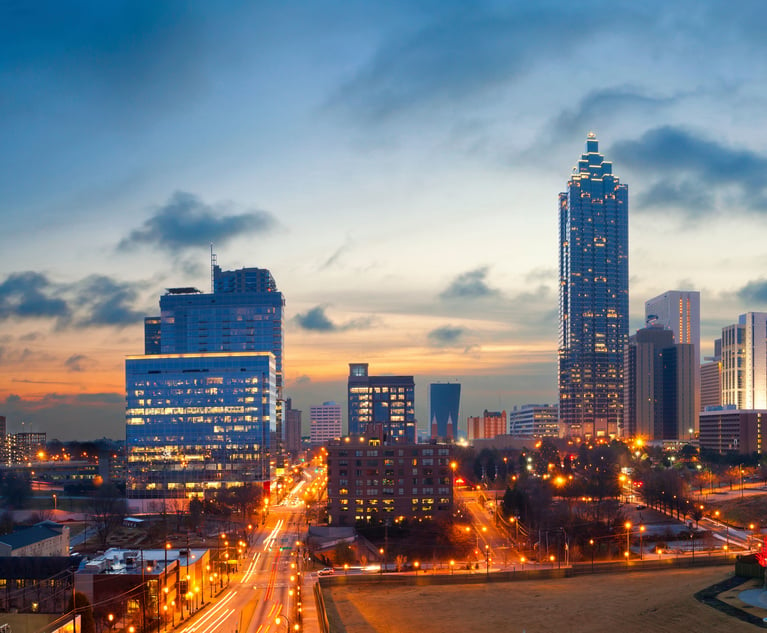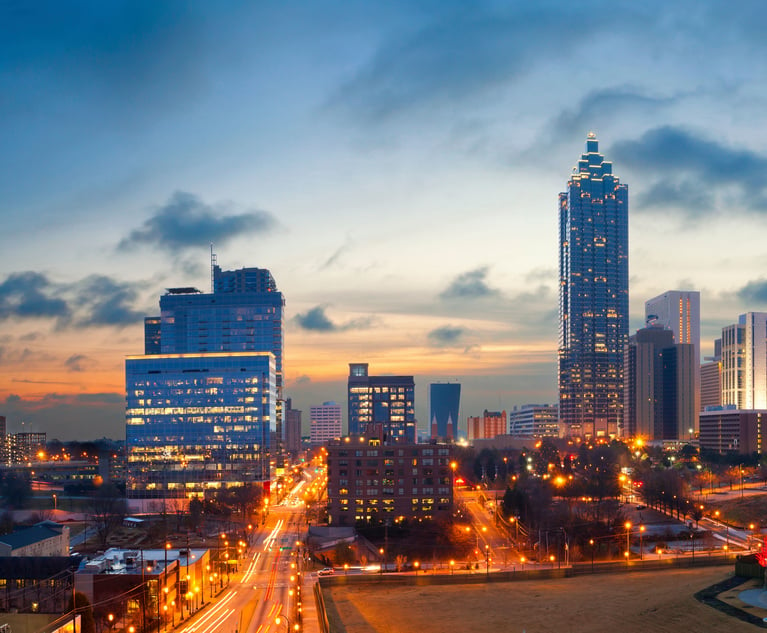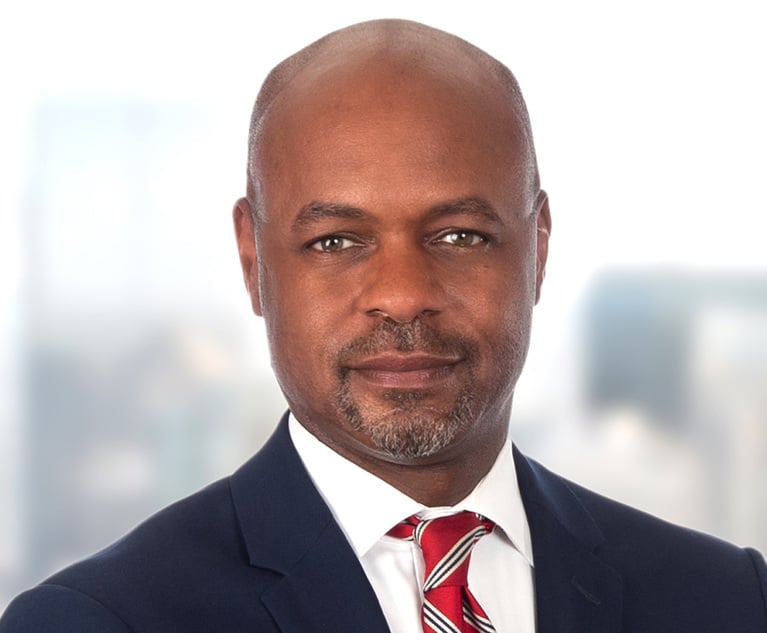 Chris Stewart, Atlanta. (Photo: John Disney/ ALM)
Chris Stewart, Atlanta. (Photo: John Disney/ ALM)Arbery Family Lawyer: 'Justice by Video' Is Not Justice
L. Chris Stewart of Stewart Trial Attorneys, in a Daily Report interview, drew comparisons between the Ahmaud Arbery case and that of Walter Scott, a case that put Stewart in the national spotlight in 2015.
May 21, 2020 at 02:25 PM
4 minute read
The Atlanta lawyer who has joined the legal team representing the family of Ahmaud Arbery—who said he is working on litigation related to the fatal shooting, and predicts that "there's going to be a ton of people getting sued"—certainly has experience in police shooting cases where video plays a crucial role.
In a phone interview with the Daily Report Thursday, L. Chris Stewart of Stewart Trial Attorneys would not give details of planned lawsuits, but he said he will serve as local counsel for S. Lee Merritt of Philadelphia, the civil rights attorney representing Arbery's mother. Civil rights attorney Ben Crump of Tallahassee, Florida, is representing Arbery's father.
Stewart said he has known both Merritt and Crump for years and was quick to say yes when Merritt asked for his help.
"This happened in my state," said Stewart, who has traveled around the country to represent families of young, unarmed black men shot by white police officers.
Arbery was killed on Feb. 23. No arrests were made until May 7—two days after the release on social media of a video of the shooting. Gregory McMichael, 64, a former Brunswick police officer and district attorney investigator, and his son Travis McMichael, 34, were charged with murder and aggravated assault.
Crump has said the Arbery case bears a chilling similarity to the one that made him famous: He represented the family of Trayvon Martin—the teenager killed by a neighbor in Florida while walking home in 2012. The shooters in both the Martin and Arbery cases claimed justification because they were suspicious that the young men were involved in recent neighborhood burglaries.
Arbery's death also brings up memories of a case that put Stewart in the national spotlight in 2015—a case that was largely defined by video of the incident at issue. Stewart negotiated a $6.5 million settlement with the city of North Charleston, South Carolina, for the family of Walter Scott, who was killed by a police officer.
In that case, the officer blamed Scott for fighting over a taser. But the officer was arrested—and later pleaded guilty—after a video of the shooting was released on social media. The video showed Scott running away, and the officer shooting him in the back. The officer then radioed a colleague to say he shot someone who was trying to take his taser. The officer is shown walking to the body and planting his taser on the ground.
As with the Scott shooting, no arrests were made for Arbery's death until after a video of the shooting went viral on the internet. And in both cases, police initially blamed the victim, Stewart said. Scott was blamed for running away from an approaching officer. His family believed he ran because he knew he had an outstanding arrest warrant for unpaid child support.
Arbery was called a burglary suspect by one of the prosecutors—who later recused himself and was replaced, and is now the subject of a Georgia Bureau of Investigation inquiry. But the video showed Arbery unarmed and jogging down a road, being confronted by two men with guns, struggling with one of them and being shot.
"All too often, African Americans get justice by video," Stewart said during a rally Wednesday that he attended with Merritt. "And that is not just immoral and improper and illegal, that is not justice."
This content has been archived. It is available through our partners, LexisNexis® and Bloomberg Law.
To view this content, please continue to their sites.
Not a Lexis Subscriber?
Subscribe Now
Not a Bloomberg Law Subscriber?
Subscribe Now
NOT FOR REPRINT
© 2025 ALM Global, LLC, All Rights Reserved. Request academic re-use from www.copyright.com. All other uses, submit a request to [email protected]. For more information visit Asset & Logo Licensing.
You Might Like
View All
New Year, New Am Law 100: Challenges Await These Newly Merged Law Firms
7 minute read
On the Move: Freeman Mathis & Gary Promotes 16 to Partner, Expands to Denver
5 minute read

Georgia Supreme Court Honoring Troutman Pepper Partner, Former Chief Justice
2 minute readTrending Stories
Who Got The Work
Michael G. Bongiorno, Andrew Scott Dulberg and Elizabeth E. Driscoll from Wilmer Cutler Pickering Hale and Dorr have stepped in to represent Symbotic Inc., an A.I.-enabled technology platform that focuses on increasing supply chain efficiency, and other defendants in a pending shareholder derivative lawsuit. The case, filed Oct. 2 in Massachusetts District Court by the Brown Law Firm on behalf of Stephen Austen, accuses certain officers and directors of misleading investors in regard to Symbotic's potential for margin growth by failing to disclose that the company was not equipped to timely deploy its systems or manage expenses through project delays. The case, assigned to U.S. District Judge Nathaniel M. Gorton, is 1:24-cv-12522, Austen v. Cohen et al.
Who Got The Work
Edmund Polubinski and Marie Killmond of Davis Polk & Wardwell have entered appearances for data platform software development company MongoDB and other defendants in a pending shareholder derivative lawsuit. The action, filed Oct. 7 in New York Southern District Court by the Brown Law Firm, accuses the company's directors and/or officers of falsely expressing confidence in the company’s restructuring of its sales incentive plan and downplaying the severity of decreases in its upfront commitments. The case is 1:24-cv-07594, Roy v. Ittycheria et al.
Who Got The Work
Amy O. Bruchs and Kurt F. Ellison of Michael Best & Friedrich have entered appearances for Epic Systems Corp. in a pending employment discrimination lawsuit. The suit was filed Sept. 7 in Wisconsin Western District Court by Levine Eisberner LLC and Siri & Glimstad on behalf of a project manager who claims that he was wrongfully terminated after applying for a religious exemption to the defendant's COVID-19 vaccine mandate. The case, assigned to U.S. Magistrate Judge Anita Marie Boor, is 3:24-cv-00630, Secker, Nathan v. Epic Systems Corporation.
Who Got The Work
David X. Sullivan, Thomas J. Finn and Gregory A. Hall from McCarter & English have entered appearances for Sunrun Installation Services in a pending civil rights lawsuit. The complaint was filed Sept. 4 in Connecticut District Court by attorney Robert M. Berke on behalf of former employee George Edward Steins, who was arrested and charged with employing an unregistered home improvement salesperson. The complaint alleges that had Sunrun informed the Connecticut Department of Consumer Protection that the plaintiff's employment had ended in 2017 and that he no longer held Sunrun's home improvement contractor license, he would not have been hit with charges, which were dismissed in May 2024. The case, assigned to U.S. District Judge Jeffrey A. Meyer, is 3:24-cv-01423, Steins v. Sunrun, Inc. et al.
Who Got The Work
Greenberg Traurig shareholder Joshua L. Raskin has entered an appearance for boohoo.com UK Ltd. in a pending patent infringement lawsuit. The suit, filed Sept. 3 in Texas Eastern District Court by Rozier Hardt McDonough on behalf of Alto Dynamics, asserts five patents related to an online shopping platform. The case, assigned to U.S. District Judge Rodney Gilstrap, is 2:24-cv-00719, Alto Dynamics, LLC v. boohoo.com UK Limited.
Featured Firms
Law Offices of Gary Martin Hays & Associates, P.C.
(470) 294-1674
Law Offices of Mark E. Salomone
(857) 444-6468
Smith & Hassler
(713) 739-1250






